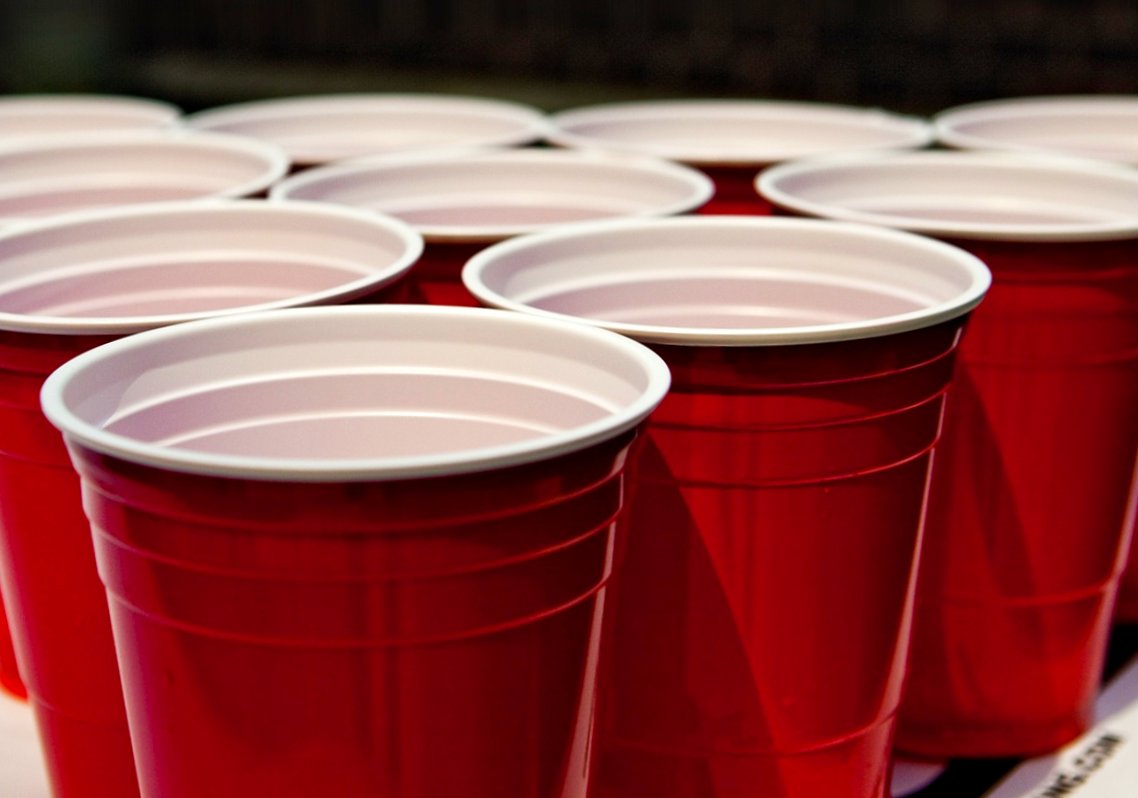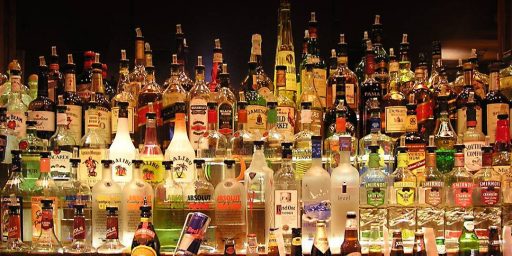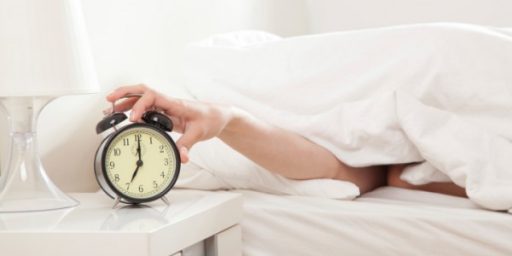Class Times and Drinking Behavior
A new study shows that college students who take late classes drink more alcohol.
Quite often, correlational relationships lead to questions about directionality. A case in point: a new study showing that college students who take late classes are more likely to stay out late drinking.
Lifehacker (“Later Class Times May Lead to Poorer Grades and More Drinking“):
Having classes start later seems like it would be a great advantage, for night owls, at least, who can sleep a bit longer. A new study, however, associates later class times with more alcohol drinking, poorer sleep and lower GPAs.
Dr. Pamela Thatcher surmises that “Later class start times seemed to change the choices students make: They sleep longer, and they drink more.” Student who said they were night owls were also more likely to consume more alcohol and have a delayed sleep schedule. The study found that the resulting poorer sleep led to modestly lower grades overall. (Also of note: In a previous study, Dr. Thatcher found that pulling all-nighters was associated with lower grades.)
So, to get better grades, get better sleep and reduce alcohol consumption. You might be able to force yourself to do this by taking classes that start earlier.
Now, this seems plausible. Presumably, responsible kids adjust their behavior to their schedule. Then again, they also adjust their schedule to their behavior.
When I was in college, I was in ROTC and had physical training at 6 am three days a week and thus tended to get to bed between 10 and 11 pm. I adjusted to that schedule and, indeed, pretty much keep it a quarter-century later. Well, except for the PT part.
I was also the king of the 7:30 am class since I was up and on campus already. And, in my teaching days, I scheduled most of my classes as early as possible. Since I’m up early, my peak performance period tends to be early, too.
Conversely, I’d wager that the kind of student who stays out late partying on a regular basis is also the kind who avoids early morning classes like the plague, signing up for them only when they really, really have to. After all, they know their lifestyle and should have as much incentive to adjust the things they can control accordingly.
Additionally, unless the study controlled for this very carefully, I’d guess that class performance is a spurious variable here. Students who are partying at night and hung over in the morning are less likely to be effective in their studies. Not only are they too busy with their social life and too sick to study, they probably care less about their grades to begin with than their sober peers. Until the grades come out, of course.
(Tangentially related: If Google Images is any indication, college parties involve substantially more nudity and oral- and gay sex than in my day.)
hat tip: John Personna







Conversely, I’d wager that the kind of student who stays out late partying on a regular basis is also the kind who avoids early morning classes like the plague, signing up for them only when they really, really have to.
Exactly. Later classes don’t lead to more drinking, but rather the inverse. And poor performance is obviously related to all the partying.
When I was an undergrad, I know I avoided late classes because I wanted to be up at night having fun. That behavior didn’t last all that long, as my grades suffered as a result. Once I started devoting more of my nights to schoolwork, I started getting to bed earlier, and started taking earlier classes. And my grades improved.
(Tangentially related: If Google Images is any indication, college parties involve substantially more nudity and oral- and gay sex than in my day.)
Heh. I don’t think Google Images is representative of any reality I’m familiar with.
Two things:
1. Perhaps my experience was a bit different than college now [although my experience ended only 3 years ago, so I don’t think it could have changed that much], but I did not have much choice in my class schedule, at least not after I was 21. During my junior and senior years I was taking higher level classes that only had one–at most 2–time slots to choose from. While I had a bit of wiggle room in my schedule, most of my class times were dictated by what I needed to complete to graduate, and what I wanted my emphases to be.
2. I’m curious as to how much drinking or how late a student would have to stay up to truly affect their grades. This quote stood out to me:
While drinking late now definitely leads to a hung over morning, 4 years ago when I was a lot slimmer, had a much higher tolerance, and was used to the crazy college schedule, hangovers or ill-effects of drinking weren’t really a factor. My body was able to handle it better. I could study until 11, go out to the bars until 1:30 or so, and be up for my 7:30 with little trouble (so long as I grabbed a cup of coffee on the way out). I know not every student could claim this, but I think the idea that the physical effects of alcohol affects many college students’ performances may not pan out. More likely, those students who drink too often (rather than too great of amounts), have a less than stellar dedication to school work in general or have the wrong goals in place.
More likely, those students who drink too often (rather than too great of amounts), have a less than stellar dedication to school work in general or have the wrong goals in place.
That was certainly the case with me, at least in the beginning of college.
Yeah, she got the causation reversed there.
I think it is more of an indicator than a determinant in either direction. Kids who aren’t disciplined are always looking for the easier way out and in many cases late classes merely helps those who want that.
I did my damndest not to have any classes before 10am. This did not cause me to drink. I was already drinking, and have never been a morning person.
That’s she’s reversed cause and effect here is far more likely than not here, I’d say. When I was in college and drinking, I avoided early morning classes like the plague.
But, then, I did the same when I was back in college sober. The only 8 AM class I took in three years of law school was the one that I was required to take that was only offered at that ungodly hour. And, over a decade later, I still avoid early morning appointments if I can (and loathe having to go to motion hour in the courts that insist on having it before 9). Drunk or sober, I’m a night owl, not a morning person. Nor is being able to sleep in (a lot then or a bit now) in the morning before having to be somewhere the cause of what I do the evening before.
So, at best, I’d say that being inclined to drink also makes one inclined to adjust one’s schedule accordingly, not the other way ’round. And, frankly, that’s such a patently obvious conclusion, I wonder how Dr. Thatcher convinced anyone to fund this “research.”
I must be the rare counter-example, a morning person who rarely signs up for evening classes, but finds that those classes leave me a bit wired, and open to suggestion for further recreation.